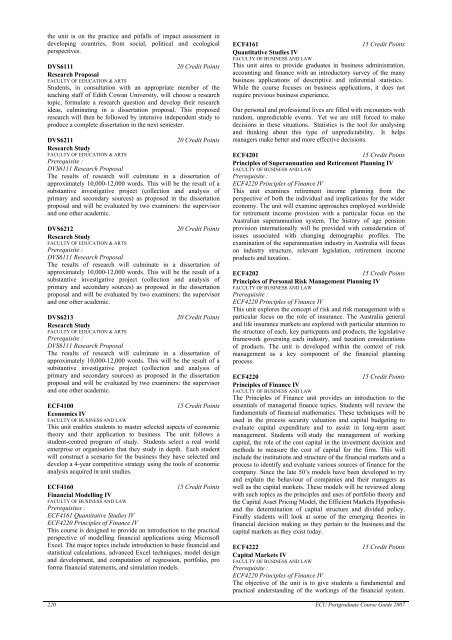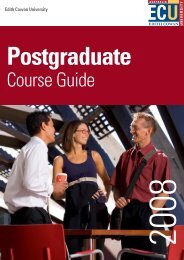Course Guide - Edith Cowan University
Course Guide - Edith Cowan University
Course Guide - Edith Cowan University
You also want an ePaper? Increase the reach of your titles
YUMPU automatically turns print PDFs into web optimized ePapers that Google loves.
the unit is on the practice and pitfalls of impact assessment in<br />
developing countries, from social, political and ecological<br />
perspectives.<br />
DVS6111<br />
20 Credit Points<br />
Research Proposal<br />
FACULTY OF EDUCATION & ARTS<br />
Students, in consultation with an appropriate member of the<br />
teaching staff of <strong>Edith</strong> <strong>Cowan</strong> <strong>University</strong>, will choose a research<br />
topic, formulate a research question and develop their research<br />
ideas, culminating in a dissertation proposal. This proposed<br />
research will then be followed by intensive independent study to<br />
produce a complete dissertation in the next semester.<br />
DVS6211<br />
20 Credit Points<br />
Research Study<br />
FACULTY OF EDUCATION & ARTS<br />
Prerequisite :<br />
DVS6111 Research Proposal<br />
The results of research will culminate in a dissertation of<br />
approximately 10,000-12,000 words. This will be the result of a<br />
substantive investigative project (collection and analysis of<br />
primary and secondary sources) as proposed in the dissertation<br />
proposal and will be evaluated by two examiners: the supervisor<br />
and one other academic.<br />
DVS6212<br />
20 Credit Points<br />
Research Study<br />
FACULTY OF EDUCATION & ARTS<br />
Prerequisite :<br />
DVS6111 Research Proposal<br />
The results of research will culminate in a dissertation of<br />
approximately 10,000-12,000 words. This will be the result of a<br />
substantive investigative project (collection and analysis of<br />
primary and secondary sources) as proposed in the dissertation<br />
proposal and will be evaluated by two examiners: the supervisor<br />
and one other academic.<br />
DVS6213<br />
20 Credit Points<br />
Research Study<br />
FACULTY OF EDUCATION & ARTS<br />
Prerequisite :<br />
DVS6111 Research Proposal<br />
The results of research will culminate in a dissertation of<br />
approximately 10,000-12,000 words. This will be the result of a<br />
substantive investigative project (collection and analysis of<br />
primary and secondary sources) as proposed in the dissertation<br />
proposal and will be evaluated by two examiners: the supervisor<br />
and one other academic.<br />
ECF4100<br />
15 Credit Points<br />
Economics IV<br />
FACULTY OF BUSINESS AND LAW<br />
This unit enables students to master selected aspects of economic<br />
theory and their application to business. The unit follows a<br />
student-centred program of study. Students select a real world<br />
enterprise or organisation that they study in depth. Each student<br />
will construct a scenario for the business they have selected and<br />
develop a 4-year competitive strategy using the tools of economic<br />
analysis acquired in unit studies.<br />
ECF4160<br />
15 Credit Points<br />
Financial Modelling IV<br />
FACULTY OF BUSINESS AND LAW<br />
Prerequisites :<br />
ECF4161 Quantitative Studies IV<br />
ECF4220 Principles of Finance IV<br />
This course is designed to provide an introduction to the practical<br />
perspective of modelling financial applications using Microsoft<br />
Excel. The major topics include introduction to basic financial and<br />
statistical calculations, advanced Excel techniques, model design<br />
and development, and computation of regression, portfolio, pro<br />
forma financial statements, and simulation models.<br />
ECF4161<br />
15 Credit Points<br />
Quantitative Studies IV<br />
FACULTY OF BUSINESS AND LAW<br />
This unit aims to provide graduates in business administration,<br />
accounting and finance with an introductory survey of the many<br />
business applications of descriptive and inferential statistics.<br />
While the course focuses on business applications, it does not<br />
require previous business experience.<br />
Our personal and professional lives are filled with encounters with<br />
random, unpredictable events. Yet we are still forced to make<br />
decisions in these situations. Statistics is the tool for analysing<br />
and thinking about this type of unpredictability. It helps<br />
managers make better and more effective decisions.<br />
ECF4201<br />
15 Credit Points<br />
Principles of Superannuation and Retirement Planning IV<br />
FACULTY OF BUSINESS AND LAW<br />
Prerequisite :<br />
ECF4220 Principles of Finance IV<br />
This unit examines retirement income planning from the<br />
perspective of both the individual and implications for the wider<br />
economy. The unit will examine approaches employed worldwide<br />
for retirement income provision with a particular focus on the<br />
Australian superannuation system. The history of age pension<br />
provision internationally will be provided with consideration of<br />
issues associated with changing demographic profiles. The<br />
examination of the superannuation industry in Australia will focus<br />
on industry structure, relevant legislation, retirement income<br />
products and taxation.<br />
ECF4202<br />
15 Credit Points<br />
Principles of Personal Risk Management Planning IV<br />
FACULTY OF BUSINESS AND LAW<br />
Prerequisite :<br />
ECF4220 Principles of Finance IV<br />
This unit explores the concept of risk and risk management with a<br />
particular focus on the role of insurance. The Australia general<br />
and life insurance markets are explored with particular attention to<br />
the structure of each, key particpants and products, the legislative<br />
framework governing each industry, and taxation considerations<br />
of products. The unit is developed within the context of risk<br />
management as a key component of the financial planning<br />
process.<br />
ECF4220<br />
15 Credit Points<br />
Principles of Finance IV<br />
FACULTY OF BUSINESS AND LAW<br />
The Principles of Finance unit provides an introduction to the<br />
essentials of managerial finance topics. Students will review the<br />
fundamentals of financial mathematics. These techniques will be<br />
used in the process security valuation and capital budgeting to<br />
evaluate capital expenditure and to assist in long-term asset<br />
management. Students will study the management of working<br />
capital, the role of the cost capital in the investment decision and<br />
methods to measure the cost of capital for the firm. This will<br />
include the institutions and structure of the financial markets and a<br />
process to identify and evaluate various sources of finance for the<br />
company. Since the late 50’s models have been developed to try<br />
and explain the behaviour of companies and their managers as<br />
well as the capital markets. These models will be reviewed along<br />
with such topics as the principles and uses of portfolio theory and<br />
the Capital Asset Pricing Model, the Efficient Markets Hypothesis<br />
and the determination of capital structure and divided policy.<br />
Finally students will look at some of the emerging theories in<br />
financial decision making as they pertain to the business and the<br />
capital markets as they exist today.<br />
ECF4222<br />
15 Credit Points<br />
Capital Markets IV<br />
FACULTY OF BUSINESS AND LAW<br />
Prerequisite :<br />
ECF4220 Principles of Finance IV<br />
The objective of the unit is to give students a fundamental and<br />
practical understanding of the workings of the financial system.<br />
220 ECU Postgraduate <strong>Course</strong> <strong>Guide</strong> 2007



